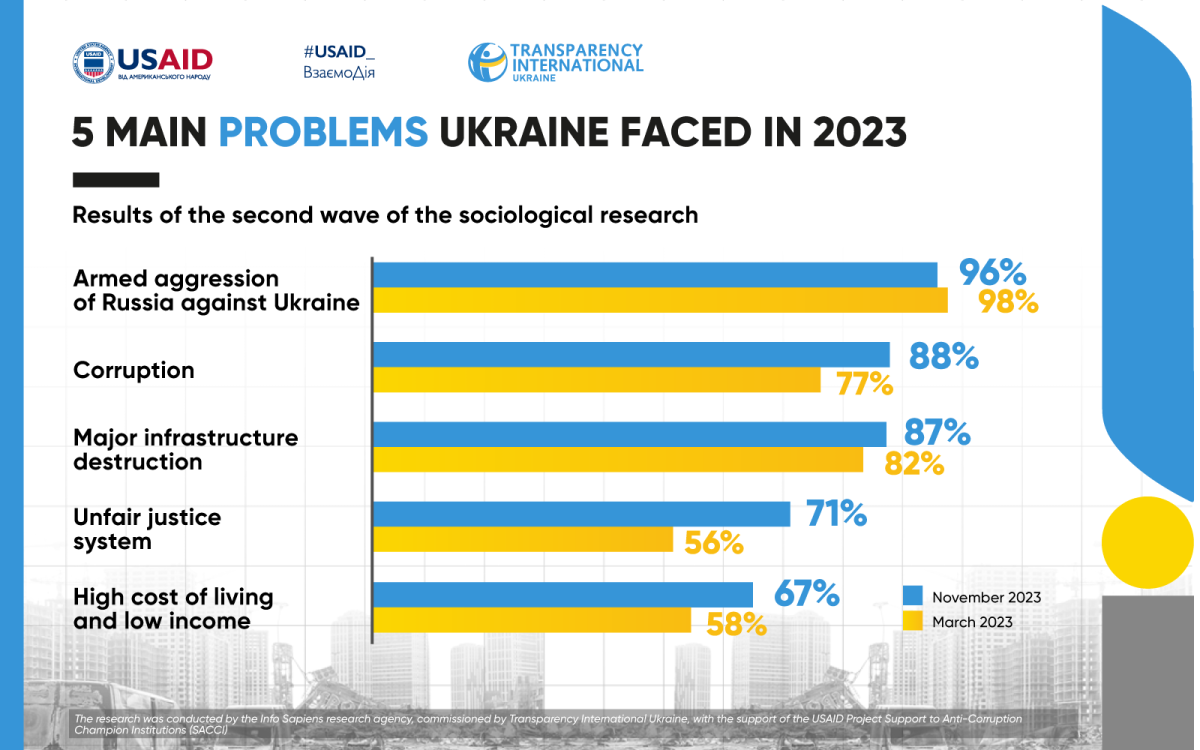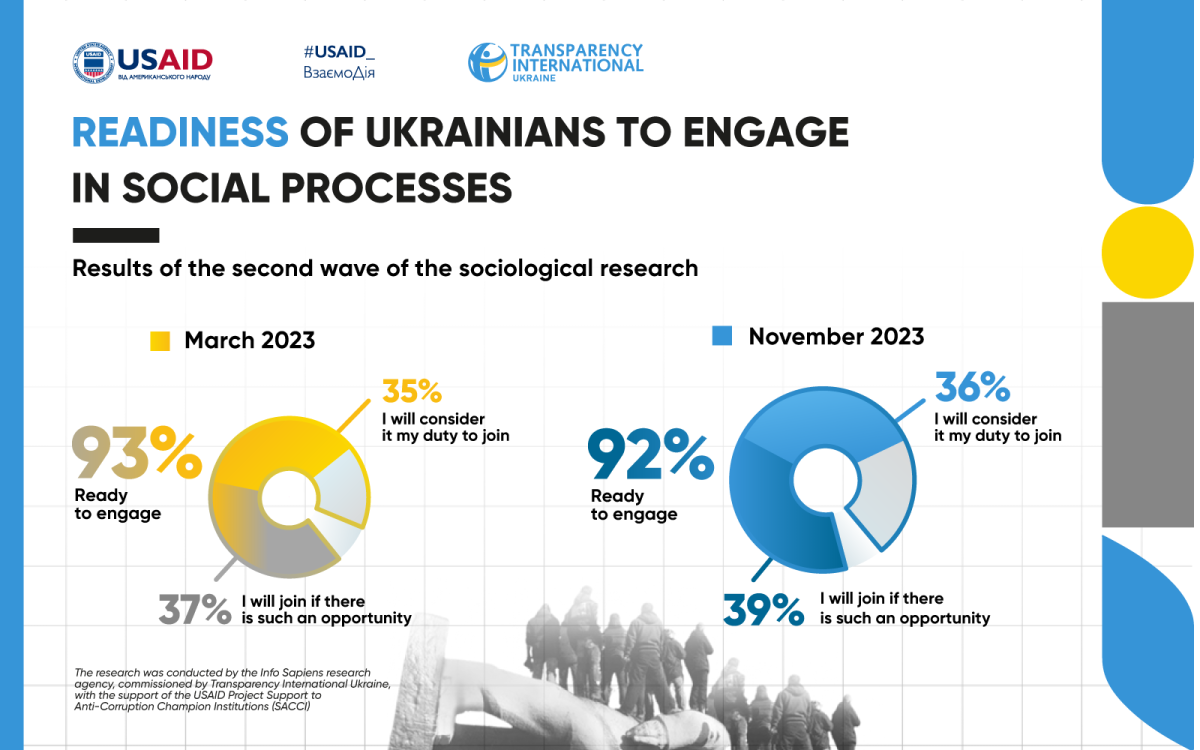

The Info Sapiens research agency conducted the second wave of the sociological survey among the population and mayors on challenges and problems, expectations, and overall assessments of the situation, in particular regarding the recovery processes in Ukraine. The survey was commissioned by Transparency International Ukraine with the support of the USAID Project Support to Anti-Corruption Champion Institutions (SACCI).
The results of the first wave of the survey showed that 73% of Ukrainians were most concerned about the resumption of corruption schemes in the country’s reconstruction processes. 63% of citizens had concerns about the lack of control and, as a result, the embezzlement of public funds. The resumption of hostilities was ranked only third (55%).
How has the opinion of Ukrainians changed in six months? What concerns Ukrainians have at the end of 2023? What problems do the mayors of Ukrainian cities face in the recovery process? Find out more in the study.
Main issues Ukraine faces
As in March, Ukrainians consider the following three issues to be the most significant: war (November 96%, March 98%), corruption (November 88%, March 77%), and destruction of infrastructure and housing (November 82%, March 87%). There are fewer concerns about war and destruction, while corruption risks worry Ukrainians more: the figure has grown by 11%.
Ukrainians are now more concerned about the problems associated with the economy: the high cost of living, low incomes, and the outflow of the able-bodied population from Ukraine.
According to IDPs in October-November, they mostly plan to return home like they did half a year ago (November 63%, March 62%). There are fewer people who want to stay in the city where they found refuge since the beginning of the war. The main restraining factors for IDPs in terms of returning home remain the lack of security, possible blackouts, or the lack of electricity and heating. However, nowadays, the developed infrastructure (kindergartens, schools, and hospitals) is becoming less important as a reason to stay in a place of temporary refuge.
Ukrainians consider the following three issues to be the most significant: war (96%), corruption (88%), and destruction of infrastructure and housing (82%).
How do Ukrainians assess the processes of reconstructing damaged facilities in the country?
In general, the current reconstruction processes meet or exceed the expectations of 46% of Ukrainians. They are most positively perceived in the Eastern (52%) and Northern (50%) regions of Ukraine. However, Kyiv residents are more critical in their assessment; their expectations are often not met; 51% of the capital’s residents think so. The reconstruction fully meets the expectations of 39% of Kyiv residents.
Every third adult Ukrainian (31%) knows or has seen examples of what has already been rebuilt. The vast majority of them (74%) are satisfied with the result.
Reconstruction is most noticeable in the capital (59%), in the Northern (42%) and Eastern regions (41%). Residents of the South (33%) and the Central region (22%) are less aware of the ongoing reconstruction processes; the West (19%) is the least aware.
Among the respondents, 17% suffered damage to property (mainly real estate). The highest number of victims accounts for the East of Ukraine: every second person suffered losses. The South is ranked second (32%).
The total amount of damage suffered is mainly estimated as follows:
- in the range of UAH 0–100,000 — 41%;
- in the range of UAH 101,000–UAH 1 mln — 20%;
- more than UAH 1 mln — 13%.
- hard to say — 27%.
The majority (65%) of those who suffered damage and destruction did not apply for compensation. Of these, a significant part (37%) believes that the state has more urgent needs, 12% of respondents believe that there are people who have suffered more, so the state should help them. 26% did not apply for assistance because they did not believe that they would receive it.
The majority (65%) of those who suffered damage and destruction did not apply for compensation. Of these, a significant part (37%) believes that the state has more urgent needs, 12% of respondents believe that there are people who have suffered more, so the state should help them.
Aid and funding
Since the beginning of the full-scale invasion, almost half of the citizens (42%) have received at least some aid. Most of them are in the East — 88%, in the South — 63%, and in the Central region — 25%.
According to the respondents, the main sources of assistance are international funds (35%), the state (33%), Ukrainian CSOs, foundations and volunteers (28%), and international CSOs (25%).
43% of Ukrainians note the significant contribution of international donors to the reconstruction of Ukraine. Young people most positively assess the assistance of international partners primarily because of their better awareness.
In general, residents of all regions positively assess the contribution of international donors: the East (46%), the North (49%), the capital (50%). However, in some regions, people are poorly aware of the participation of international partners; in the Western region, 47% of respondents are not aware of this, in the Central region — 43%.
43% of Ukrainians note the significant contribution of international donors to the reconstruction of Ukraine. Young people most positively assess the assistance of international partners primarily because of their better awareness.
Duration of reconstruction according to expectations
Ukrainians are preparing for a longer reconstruction process, as opposed to their views on it six months ago. Compared to the previous wave of the research, the share of Ukrainians who believe that the reconstruction will last more than 10 years has significantly increased. In March, 63% of the population believed so; in November, 73% expect that the restoration will last up to 10 years or more. Ukrainians expect the economic recovery to last as much: 70% believe that this process will take 10 years or more.
Ukrainians insist that the government should consult the public on matters of reconstruction, and this aspiration has not changed in six months: 92% in autumn and 93% in spring.
The main concerns Ukrainians have regarding post-war reconstruction of the country
As back in spring, the population sees corruption as the greatest risk in the restoration of Ukraine under two parameters at once: the lack of control resulting in embezzlement of funds (79%), the resumption of corruption schemes (75%). The large scale of destruction (65%) and the threat of the recurrence of hostilities (63%) are ranked third and fourth, respectively.
Restoration through the eyes of mayors
In November 2023, the Info Sapiens research agency conducted 10 profound interviews with mayors and deputy mayors at the request of Transparency International Ukraine.
Key findings from the survey. City leaders believe that the future recovery should take place according to the following criteria:
- A clear and understandable concept of reconstruction and the distribution of funds between larger and smaller cities. City managers emphasize the importance of considering the cities’ ability to co-finance projects. They emphasize the need for an individual approach to different cities and regions.
- Considering the scale of destruction when distributing funds. An individual approach to cities with large-scale/total destruction and those without significant destruction.
- Considering the number of IDPs when distributing funds between cities. The need for different strategies for cities with more and fewer IDPs.
City managers also noted that for successful recovery, they need:
- Engagement of specialists and international teams to work with communities after the victory.
- Assistance in the development of reconstruction strategies and support for communities in this process.
- Support from international organizations and states in the development and implementation of projects.
- Resumption of powers and restoration of the right of local authorities to dispose of funds after the war.
A clear and understandable concept of reconstruction and the distribution of funds between larger and smaller cities. City managers emphasize the importance of considering the cities' ability to co-finance projects. They emphasize the need for an individual approach to different cities and regions.
Transparency International Ukraine is an accredited chapter of the global movement Transparency International, helping Ukraine grow stronger since 2012. The organization takes a comprehensive approach to the development and implementation of changes for reduction of corruption levels in certain areas.
TI Ukraine helped create and subsequently transferred Prozorro, Prozorro.Sale, eHealth, and Prozvit systems to the state. The team also implemented City Transparency and Accountability Rankings, developed the DOZORRO community to control public procurement, and co-founded the RISE UA Coalition, which protects integrity and efficiency in the rebuilding process.
This research was made possible by the support of the American people through the United States Agency for International Development (USAID) within the SACCI project. The content of this publication is the sole responsibility of Transparency International Ukraine and does not necessarily reflect the views of USAID or the United States Government.
For reference: The Support to Anti-Corruption Champion Institutions Program in Ukraine (SACCI) is a seven-year initiative of the United States Agency for International Development (USAID), which aims to assist Ukraine to combat corruption and increase accountability and transparency of governance in Ukraine. The program seeks to empower key government institutions to fight corruption, build public support for and engagement in anti-corruption efforts, reduce citizen tolerance to corruption, as well as ensure maximum transparency and accountability of Ukraine’s post-war reconstruction and recovery









